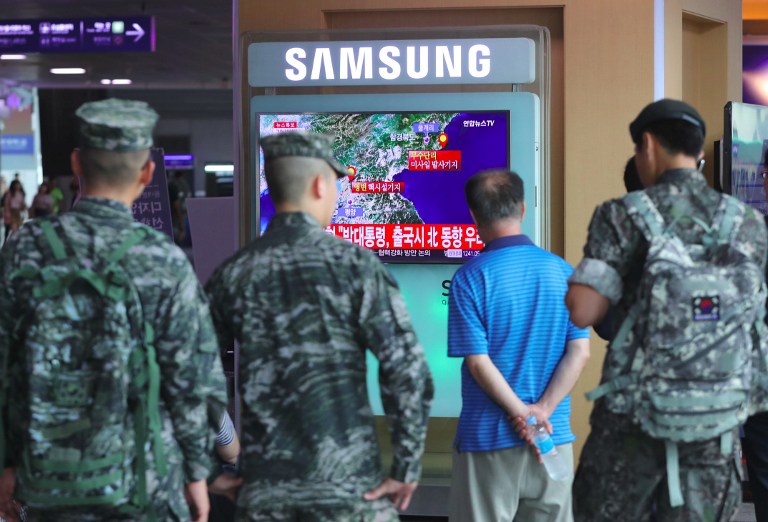
North Korea claimed on September 9 it had successfully tested a nuclear warhead that could be mounted on a missile, drawing condemnation from the South over the “maniacal recklessness” of young ruler Kim Jong-Un. / AFP PHOTO / YONHAP
UNITED NATIONS, United States (AFP) – by Carole LANDRY with Jung Ha-Won in Seoul
World powers expressed outrage Friday after North Korea claimed it had successfully tested a nuclear warhead that could be mounted on a missile, prompting urgent UN talks and calls for new sanctions.
South Korea, the United States, Japan, Russia and China all condemned the blast at the Punggye-ri nuclear site, the North’s fifth and most powerful yet at 10 kilotons.
At the United Nations, Secretary-General Ban Ki-moon urged the Security Council — set to discuss the issue at 1900 GMT — to take “appropriate action” after what he called a “brazen breach” of the council’s resolutions.
“The patience on our side and that of the international community has already reached its limit,” South Korean President Park Geun-Hye said, slamming the North’s young leader Kim Jong-Un for his “maniacal recklessness.”
The news drew swift condemnation from US President Barack Obama, who called the test “a grave threat to regional security and to international peace and stability” and vowed to push for new international sanctions.
Japan condemned the test as “absolutely unacceptable,” Russia expressed “extreme concern,” and the head of the UN atomic watchdog said it was a “clear violation” of numerous Security Council resolutions.
“I count on the Security Council to remain united and take appropriate action. We must urgently break this accelerating spiral of escalation,” Ban told reporters ahead of the Security Council talks called by the United States and Japan.
Obama said he had called the leaders of South Korea and Japan to confer over the crisis, with Park and Japanese leader Shinzo Abe also agreeing to cooperate closely with each other.
Search for clues
Pyongyang’s state media said the test, which comes after a series of ballistic missile launches, had realized the country’s goal of being able to fit a miniaturized warhead on a rocket.
“Our nuclear scientists staged a nuclear explosion test on a newly developed nuclear warhead at the country’s northern nuclear test site,” a North Korean TV presenter said.
First indications of an underground explosion came when seismic monitors detected a 5.3-magnitude “artificial earthquake” near the Punggye-ri nuclear site.
“The 10-kiloton blast was nearly twice the (power of the) fourth nuclear test and slightly less than the Hiroshima bombing, which was measured about 15 kilotons,” said Kim Nam-Wook of the South’s meteorological agency.
But attention soon shifted from the blast’s power to Pyongyang’s claim that it was a miniaturized warhead.
If Pyongyang can make a nuclear device small enough to fit on a rocket — and bolster the range and accuracy of its missiles — it might achieve its oft-stated aim of hitting US targets. But its past claims to have achieved that have been discounted.
However, North Koreans who gathered around public screens to watch the official announcement of the test — which came on the 68th anniversary of the country’s founding — were approving.
“US bastards may be saying this and that, but we fear nothing as our military power has strengthened further,” said a woman who did not give her name.
Ordinary North Koreans usually express only officially sanctioned views when questioned by foreign news organizations.
Pyongyang routinely insists Washington is on the verge of launching all-out war against it.
The test came as American and South Korean forces staged a re-enactment of the Incheon landing, 66 years after the start of Operation Chromite, the battle that turned the tide in the Korean War.
Outside experts said authenticating North Korea’s claim to have mastered miniaturization would be difficult using seismic data alone.
“We would need to see it tested on a missile, like China did in the 1960s,” said Melissa Hanham, a North Korea expert at the Middlebury Institute of International Studies.
“Nobody wants to see that. There is no way they could do that test in a safe way, and it could easily start a war.”
China under pressure
North Korea has been hit by five sets of United Nations sanctions since it first tested a nuclear device in 2006, but has insisted it will continue come what may.
The nuclear program has accompanied a series of ballistic missile launches, the latest of which took place on Monday as world powers gathered for a G20 meeting in China.
This week’s events pose yet another challenge for Pyongyang’s chief ally, China, which has been under pressure to rein in its increasingly aggressive neighbor.
Beijing said Friday it “firmly opposes” the test, but it has limited room to maneuver. Its priority is to avoid the regime’s collapse, which would create a crisis on its border and shift the balance of power on the Korean peninsula toward the United States.
The US-Korea Institute at Johns Hopkins University said the latest development made plain that the US and South Korean strategy on restraining North Korea “has clearly failed.”
“No one should be surprised that North Korea continues to conduct nuclear tests to enhance the capabilities of its growing arsenal,” the institute’s Joel Wit said. “Nor should they expect China to solve this problem for the United States.”







